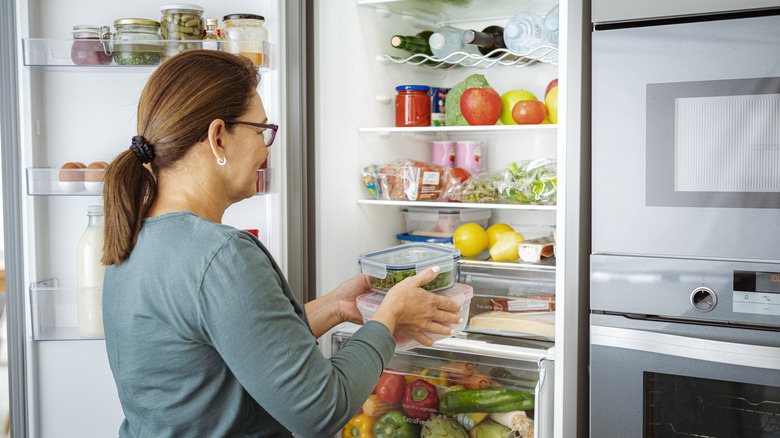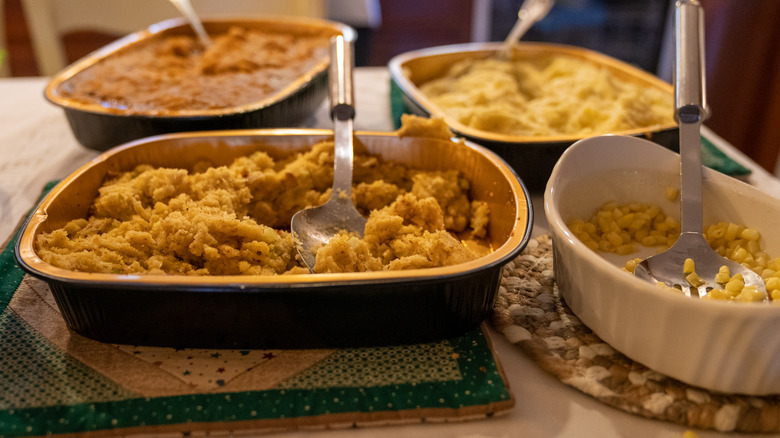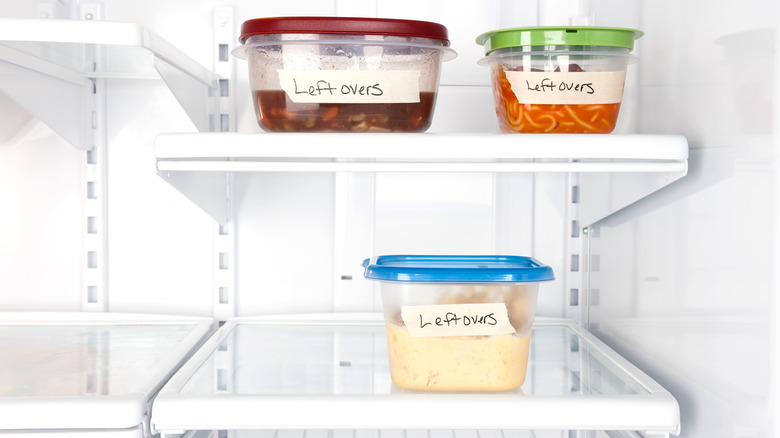This Simple Practice Can Help Keep Your Fridge Clutter-Free
Decluttering your kitchen doesn't just involve cleaning out messy cabinets and tossing items past their prime. You also need to tackle the ultimate cluttered device in your cooking room: the fridge. This isn't the most popular of chores, but a simple practice can help keep your fridge clutter-free. Instead of playing a harrowing game of Tetris with the leftovers and giving up prime real estate in your refrigerator before throwing them out when they go bad, incorporate a leftovers night into your weekly meal plan.
The idea is as simple as it sounds: Pick a day for the leftovers to get eaten and stick to it every week to keep your fridge clean and tidy. Besides keeping your refrigerator out of the cluttered realm, leftovers night will also allow you to use up the food you already have in your home, saving you money on groceries (or take-out). Plus, this trick minimizes the amount of food you take out to the trash, is one of the easiest ways to get rid of funky odors in your fridge, and gives you a night off cooking. Win-win-win!
Ways to incorporate leftover nights in your weekly routine
Although the idea is quite simple, incorporating it into your weekly routine can be a little challenging at first, especially if one of your family members (like your child or partner) doesn't appreciate leftovers much. Under such circumstances, one of the easiest ways to give the plastic containers in your fridge the boot is to give leftover nights a fun spin or a new name. Think of something that'll arouse curiosity or at least be interesting enough to get your family members to the table instead of ordering pizza.
Once everyone is at the table, lay down your mismatched buffet of leftovers and let individuals pick the items they'd like to eat. Another great way is to make a new dish from the leftovers and let your family members make up their minds about your latest creation. To ensure no plastic container gets left behind and turns into a petri dish of smelly mold, create a schedule and stick to it. For instance, if you tend to cook a big dinner on Sundays, proclaim Mondays (or Tuesdays if you want a break from eating the same food) as leftover nights. The day before grocery shopping or taking out trash is also good. If you cook bigger than necessary batches every night, have extras the next night for dinner. If you're feeling a little rebellious, consume the excess food in your fridge for lunch (gasp!).
Tips to turn your leftover nights into a resounding success
Appointing a shelf to store leftovers is the number one thing to do to ensure your fridge doesn't become a plastic container jungle. This simple step will create a dedicated space for the extra food. If you can appoint a shelf life at eye level, even better. Attaching an erasable label to the containers stating the name of the item it's currently housing along with the date you prepared (or ordered the meal) will also help you keep track of everything you store in your fridge.
In case this seems like too much work, hanging a dry-erase magnetic board in your kitchen to jot the names of the leftovers and striking them off as you consume them will also help you keep track of them. However, to ensure leftovers don't go bad after a day or are unfit for consumption when you finally get around to eating them, store them properly. Reuse your old glass jars and store the extras in airtight containers to keep food fresh longer. Moreover, refrigerate the leftovers within two hours of preparing (or heating) them to prevent disease-causing bacteria from taking over. Since most food items can last up to three days (some last even a day while some can even last you a week), make it a point to consume them before to avoid falling sick. When storing consumables in the freezer, eat them within three to four months.


